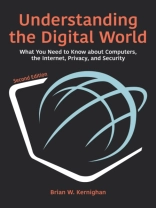A brand-new edition of the popular introductory textbook that explores how computer hardware, software, and networks work
Computers are everywhere. Some are highly visible, in laptops, tablets, cell phones, and smart watches. But most are invisible, like those in appliances, cars, medical equipment, transportation systems, power grids, and weapons. We never see the myriad computers that quietly collect, share, and sometimes leak personal data about us. Governments and companies increasingly use computers to monitor what we do. Social networks and advertisers know more about us than we should be comfortable with. Criminals have all-too-easy access to our data. Do we truly understand the power of computers in our world?
In this updated edition of Understanding the Digital World, Brian Kernighan explains how computer hardware, software, and networks work. Topics include how computers are built and how they compute; what programming is; how the Internet and web operate; and how all of these affect security, privacy, property, and other important social, political, and economic issues. Kernighan touches on fundamental ideas from computer science and some of the inherent limitations of computers, and new sections in the book explore Python programming, big data, machine learning, and much more. Numerous color illustrations, notes on sources for further exploration, and a glossary explaining technical terms and buzzwords are included.
Understanding the Digital World is a must-read for readers of all backgrounds who want to know more about computers and communications.
Om författaren
Brian W. Kernighan is a professor in the Department of Computer Science at Princeton University. His many books include
Millions, Billions, Zillions (Princeton) and the computing classic
The C Programming Language (Prentice Hall).












